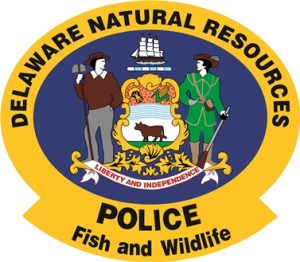Reminder for the week: Safe, ethical hunting practices encouraged for Delaware turkey season opening April 8
 DOVER – To achieve public compliance through education and enforcement actions that help conserve Delaware’s fish and wildlife resources and ensure safe boating and public safety, Fish & Wildlife Natural Resources Police officers between March 27-April 2 made 1,007 contacts with anglers, hunters, boaters and the general public, including 26 vessel boardings for boating safety, hunting and fishing regulation compliance checks, issuing 15 citations. Officers responded to 26 complaints regarding possible violations of laws and regulations or requests to assist the public. An increased Fish & Wildlife Natural Resources Police presence continued at the C&D Canal Conservation Area and associated recreational trail.
DOVER – To achieve public compliance through education and enforcement actions that help conserve Delaware’s fish and wildlife resources and ensure safe boating and public safety, Fish & Wildlife Natural Resources Police officers between March 27-April 2 made 1,007 contacts with anglers, hunters, boaters and the general public, including 26 vessel boardings for boating safety, hunting and fishing regulation compliance checks, issuing 15 citations. Officers responded to 26 complaints regarding possible violations of laws and regulations or requests to assist the public. An increased Fish & Wildlife Natural Resources Police presence continued at the C&D Canal Conservation Area and associated recreational trail.
Fish & Wildlife Natural Resources Police Actions
Citations issued by category, with the number of charges in parentheses, included:
Fisheries Conservation: Recreational: Unlicensed fishing (5), possession of shad in a closed area (1), and possession of blueback herring in a closed area (1).
Boating and Boating Safety: Operating a vessel with insufficient number of life jackets (2), and operating a personal watercraft (PWC) without lifejackets (2).
Other: Operating a motor vehicle off an established roadway on a state wildlife area (2)*, damaging state property on a wildlife area (1), and trespassing after hours on a state wildlife area (1).
*Includes citation(s) issued at the C&D Canal Conservation Area.
Are you AWARE?
Fish & Wildlife Natural Resources Police remind the public that Delaware’s 2017 spring wild turkey hunting season begins Saturday, April 8 and runs through Saturday, May 6. With the excitement of spring turkey season, hunters are reminded to always place safety and ethical hunting practices first and foremost.
Unlike some other types of hunting, turkey hunting is an interactive sport that often involves calling to the birds and moving around in the woods to increase the opportunity of harvesting a gobbler. Hunters are reminded that it is unlawful to drive wild turkeys, to shoot a wild turkey on the roost or, for safety purposes, to wear red, white or blue while hunting.
While in pursuit of wild turkeys, hunters are also reminded that it is unlawful to hunt turkeys while using bait as an attractant. Some common bait that is illegally used includes wheat, corn, sunflower seeds and various birdseed blends. Hunters are responsible for ensuring that no bait is present in an area where they are hunting turkeys.
Delaware offers hunting opportunities for wild turkeys on several state wildlife areas and state forests by permit only. To hunt wild turkeys on public land in Delaware, hunters must enter a pre-season lottery from which public lands permits are drawn. Delaware’s wild turkey season is broken down into four week-long segments. Turkey hunters are drawn via the lottery and issued a permit that enables them to hunt a specified public land area during a specified one-week segment.
Hunters selected for a public land permit must carry their permit, as well as their turkey education card and hunting license at all times while hunting. Always remember that a public permit only allows turkey hunting in a specific designated wildlife area or state forest and only during the one designated week of turkey season.
For hunters who harvest a spring gobbler, the Division of Fish & Wildlife requires that the turkey be checked at an authorized check station by 2:30 p.m. on the same day the turkey was harvested. Information obtained through the check stations is used by the Division of Fish & Wildlife to help manage Delaware’s wild turkey population.
2017 turkey check station hours may vary, so hunters are advised to call the station where they are likely to check a bird to confirm the hours of operation. Hunters who want to have their bird scored and entered into the National Wild Turkey Federation records also are reminded to have their bird’s live weight recorded on a certified scale. If the check station does not have a certified scale, hunters will be directed to another station to have the turkey re-weighed.
For turkey hunters who need to purchase a Delaware hunting license, licenses are sold online, at the licensing desk in DNREC’s Richardson & Robbins Building, 89 Kings Highway, Dover, and by license agents statewide. To find a participating agent, or to purchase a license online, visit Delaware Licenses. For additional information on Delaware hunting licenses, call 302-739-9918.
For more information on hunting in Delaware, visit the 2016-2017 Delaware Hunting and Trapping Guide. The guide also is available in printed form at DNREC’s Dover licensing desk and from license agents throughout the state. For more information about public lands that allow turkey hunting, look at the Wildlife Area Hunting Maps or State Forest Maps.
DNREC’s Division of Fish & Wildlife recognizes and thanks the majority of anglers, hunters and boaters who comply with and support Delaware’s fishing, hunting and boating laws and regulations. Citizens are encouraged to report fish, wildlife and boating violations to the Delaware Fish & Wildlife Natural Resources Police by calling 302-739-4580. Wildlife violations may also be reported anonymously to Operation Game Theft by calling 800-292-3030 or online at de.gov/ogt.
Media Contact: Sgt. John McDerby, Fish & Wildlife Natural Resources Police, 302-739-9913 or 302-354-1386
